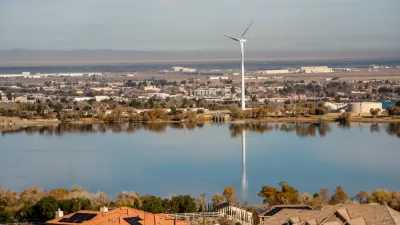The consequences of the Congressional budget approved at the end of 2019 can be measured in millions of tons of greenhouse gas emissions.

"In the massive federal spending package that Congress passed [in December], just in time to head off a government shutdown, lawmakers showed they are in no hurry for the clean energy future," reports James Bruggers and Larianne Lavelle.
"They strategically slashed most of the tax credit extenders that analysts saw as this Congress' best opportunity to accelerate renewable energy and cut U.S. greenhouse gas emissions. All that remained of the package at the end of months-long negotiation and debate were measures that will be politically useful to Republicans—most notably, biofuel subsidies."
The Rhodium Group produced analysis of the benefits of the tax breaks for zero-emitting electricity generation, finding that the tax breaks would have reduced greenhouse gas emissions by 125 million tons by 2025. Instead of benefits, concludes Rhodium, the new budget contains consequences, and "no tangible emissions benefits."
More details of the setbacks for the various federal tax breaks for various clean energy applications are included in the article.
FULL STORY: Clean Energy Loses Out in Congress’s Last-Minute Budget Deal

Maui's Vacation Rental Debate Turns Ugly
Verbal attacks, misinformation campaigns and fistfights plague a high-stakes debate to convert thousands of vacation rentals into long-term housing.

Planetizen Federal Action Tracker
A weekly monitor of how Trump’s orders and actions are impacting planners and planning in America.

Chicago’s Ghost Rails
Just beneath the surface of the modern city lie the remnants of its expansive early 20th-century streetcar system.

Bend, Oregon Zoning Reforms Prioritize Small-Scale Housing
The city altered its zoning code to allow multi-family housing and eliminated parking mandates citywide.

Amtrak Cutting Jobs, Funding to High-Speed Rail
The agency plans to cut 10 percent of its workforce and has confirmed it will not fund new high-speed rail projects.

LA Denies Basic Services to Unhoused Residents
The city has repeatedly failed to respond to requests for trash pickup at encampment sites, and eliminated a program that provided mobile showers and toilets.
Urban Design for Planners 1: Software Tools
This six-course series explores essential urban design concepts using open source software and equips planners with the tools they need to participate fully in the urban design process.
Planning for Universal Design
Learn the tools for implementing Universal Design in planning regulations.
planning NEXT
Appalachian Highlands Housing Partners
Mpact (founded as Rail~Volution)
City of Camden Redevelopment Agency
City of Astoria
City of Portland
City of Laramie





























